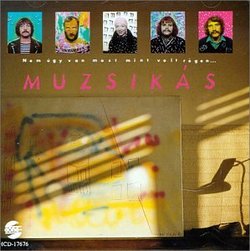| All Artists: Muzsikas Title: Nemugy Van Most Mint Volt Regen Members Wishing: 1 Total Copies: 0 Label: Studio Kft Release Date: 3/12/1999 Album Type: Import Genre: International Music Styles: Europe, Eastern Europe Number of Discs: 1 SwapaCD Credits: 1 |
Search - Muzsikas :: Nemugy Van Most Mint Volt Regen
 | Muzsikas Nemugy Van Most Mint Volt Regen Genre: International Music
|
Larger Image |
CD Details |
CD ReviewsCheck this one out! D. Gottfried | Portland, Oregon United States | 02/08/2003 (4 out of 5 stars) "I had read about "Maramaros", and went looking for it, hoping to perhaps get a taste of my ethnic roots. The usually dependable record store didn't have it, but had this - so I decided to take my chances and check it out. I later found "Maramaros", but I actually find this one more compelling! Imagine something like a cross between Steeleye Span and Camper Van Beethoven - probably a little bit of an updating of the traditions, but very nicely done. And the most beautiful song is actually sung by a guy. (Don't have his name handy.) I don't know which Muzikas to try next, but I can certainly recommend this." An early, rawer recording John L Murphy | Los Angeles | 12/17/2004 (4 out of 5 stars) "Those listeners used to Marta Sebestyen's fusion efforts, like the at times New-Age solo recording Kismet, or Muzsikas' recent reworkings of Bartok's folk melodies, may be surprised by this, which I believe is perhaps their second or third record, from at latest the early 80s. The earlier songs from the group featured more male vocals than Marta's primarily. This album showcases more of a folk-rock approach, reminiscent of Fairport Convention or Steeleye Span at times. After having heard all of the Hungarian ensemble's later work on distributed in Britain and America on the Hannibal/Carthage labels in the 90s, this earlier foray into making an ancient tradition listenable and relevant should have been issued in the West, especially by the label associated with Joe Boyd and Richard Thompson. Almost medieval meets rock at its best moments.
I bought my copy in Hungary, not having ever seen it abroad. It, Ketto, and their first, self-titled album are all worth finding. Less fluid, more jerky rhythms and squeals of pipes punctuate many tunes that sound out of the tanchaz (dance-house) ambience out of which Muzsikas began revitalising the sound of Magyar music in the 1970s and 80s. A joyful and affirming place to begin looking beyond the more accessible works for those who like an edgier, more jagged sound from the non-Gypsy repertoire." |

 Track Listings (10) - Disc #1
Track Listings (10) - Disc #1